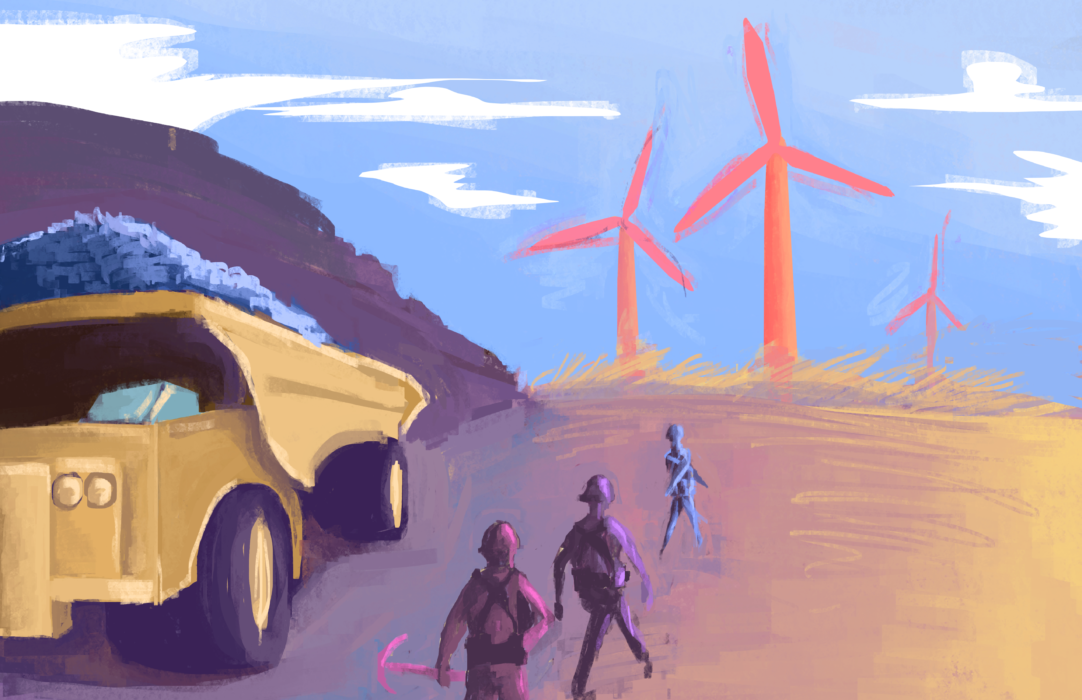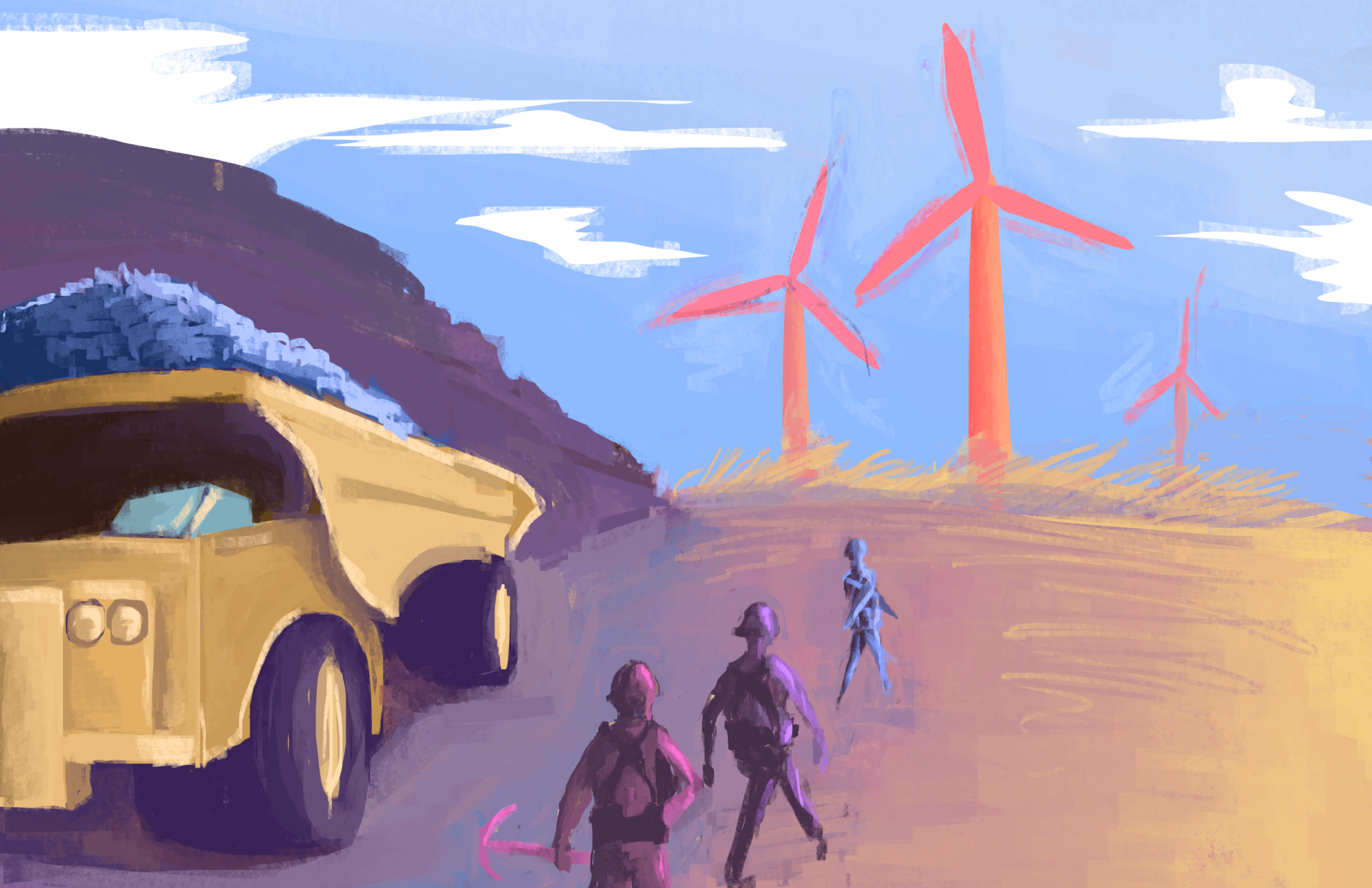
Residents of mining and drilling towns are used to boom-bust cycles. But the Powder River Basin of Montana and Wyoming, which supplies about 40 percent of the nation’s coal, for a long time had an ace in the hole: its supply of coal was critical to keeping the nation’s power plants running, so even when prices dipped, a coal mine would never cease operations.
“The one thing I’ve always been told in the 20-plus years I’ve been here is that a coal mine will never close,” said Gillette, Wyoming, resident Melissa Peterson-Worden. “And they closed two in one day.”
That day was July 1, and those two mines, Belle Ayr and Eagle Butte, bore 35.6 million tons of coal last year. The mines were owned by West Virginia-based Blackjewel, which filed for bankruptcy that day and sent some 600 workers, including Peterson-Worden, home. The mines remain shuttered, and the workers have yet to return to work.
A supervisor at one of the mines — he asked we not use his name — was off work that Monday, but his neighbor, who had been working, came over to tell him the doors had been shut.
“I was in disbelief. There’s no other way to explain it,” he said. “This doesn’t happen. It kind of hit me, like whoa, what the heck. This is not right.”
A buyer, Contura Energy, has submitted a minimum bid of $20.6 million in an upcoming auction for Blackjewel’s assets, and the company says the mines will resume full operations once the sale is finalized. But the ongoing closure has rattled workers who were sent home — not to mention countless others in the area reliant on coal mining — and industry experts say there’s more to come, potentially quickly. While Wyoming grapples with ways to protect its most important industry, its neighbors to the south are showing how fossil-fuel states can prepare for the country’s accelerating switch to energy sources other than coal.
Colorado lawmakers passed a bill this year establishing a state Just Transition Office and advisory council, which will determine how best to help coal-reliant communities transition to a new economy. And in New Mexico, the Energy Transition Act that requires the state to run on carbon-free electricity by 2050 established a workforce training program to help those affected by the closure of the coal-fired San Juan Generating Station. Advocates say these measures, while in their infancy, represent clear-eyed progress toward a clean energy grid.
“That’s a fantastic model, because it’s a recognition that things are changing, and we need to plan for it,” said Jeremy Richardson, senior energy analyst at the Union of Concerned Scientists. “They set up a process to figure out what resources are out there, what needs are in the communities, and to figure out a more comprehensive approach to the problem.”
KC Becker, Colorado’s House speaker and lead sponsor of the bill, said the Just Transition Office dovetails with the state’s goal of reducing greenhouse gas emissions 90 percent below 2005 levels by 2045. The advisory committee made of state officials, representatives from coal communities, and folks from low-income and minority communities will submit recommendations for financial and workforce assistance to the legislature by July 2020.
“We knew we wanted to work on legislation to transition to greater renewable energy and really have a focus on climate change. Knowing that, we wanted to have a just transition,” Becker said. Colorado gets about half its electricity from coal, she noted, so “as we’re trying to shift from non-renewable to renewable resources, obviously communities are going to be affected by that.”
Wyoming House Minority Leader Cathy Connolly believes the Blackjewel bankruptcy could jolt state leaders into considering a similar measure. “The entire state, particularly legislators, are deeply concerned,” she said. “We knew this was coming, but not in the manner that it did, and not as quickly as it did.”
The suddenness and scope — more than a tenth of all Powder River Basin miners were sent home — of the mine closures highlighted Wyoming’s vulnerabilities with visceral speed. Connolly said the state’s first goal is to make sure the affected workers and communities are made whole, but beyond that, Wyoming must reconsider its economic mix and tax structure.
The latter affects the former. Wyoming’s tax structure is heavily reliant on coal severance taxes and property taxes on mines. Accordingly, the state’s adaptation strategy has largely relied on finding new markets for the Powder River Basin’s plentiful carbon. State leaders want to ship coal to Asia (although West Coast states have thus far blocked the necessary export terminals). They’re also pushing for carbon capture and the creation of subsequent products from that carbon, which in theory would maintain the coal market.
The office of Wyoming Governor Mark Gordon declined to comment until after the Blackjewel bankruptcy proceedings have finished.
There’s skepticism behind the state’s strategies. A March report by the Institute for Energy Economics and Financial Analysis (IEEFA) cast doubt on Wyoming’s export plans, saying the coal isn’t of high enough quality to offset shipping costs to Asia. Furthermore, the report said that carbon capture and storage — the process of scrubbing emissions of carbon dioxide and storing it underground — prolonging the use of coal “remains a pipe dream.”
Falling prices of natural gas and renewable sources is the main driver of the Powder River Basin’s woes. The amount of coal produced in the U.S. fell from 1.17 billion tons in 2008, the all-time high, to 755 million tons last year, while renewable energy production continues to increase; in April, more electricity was produced via renewables than coal for the first time ever. Blackjewel is the sixth coal company operating in Wyoming to file for bankruptcy since 2015. The IEEFA said eight area mines, including Blackjewel’s, face “substantial risk” of closure.
Any serious federal action on climate change would accelerate the decline, too. In Wednesday’s Democratic primary debate, Washington Governor Jay Inslee, whose platform centers on climate change, said pointedly that the time for fossil fuels was up. “Our house is on fire. We have to stop using coal in 10 years, and we need a president to do it or it won’t get done,” he said. “Get off coal. Save this country and the planet.”
Blackjewel’s decline was accelerated in part by gross mismanagement. CEO Jeffrey Hoops, the Casper Star-Tribune reported, shifted millions of dollars between corporate and personal accounts. By the time it filed for bankruptcy, Blackjewel owed $146 million in unpaid taxes, and its workers were short a cumulative $700,000 in paychecks and $900,000 in retirement funds.
All this, to analyst Richardson, means Wyoming needs to act fast. Richardson comes from a coal mining family (his grandfather died of black lung) and said just transition offices like Colorado’s can help prevent scenarios like what’s taking place across Appalachia: companies flaking on cleanup responsibilities, retirement pensions, and promised health care. Blackjewel miners in Kentucky this week blocked a coal train in protest of their missing paychecks.
“There is something owed to the people that have really put a lot of blood, sweat, and tears — and, in some cases, given their lives — to help us in modern society by keeping the lights on,” Richardson said. “There’s a responsibility to make these communities whole.”
In Gillette, folks know things aren’t returning to the mid-aughts heyday. “We’ve carried the title of ‘The Energy Capital of the Nation,’ and now, what are we going to be?” Peterson-Worden said. “We don’t have an answer yet. We’re behind on carbon capture. … Wind and solar, which I’m all for, are not such a viable option for Wyoming due to the [state’s tax structure]. I really don’t know what the answer is. At this rate, we’re all open to answers.”
As Wyoming seeks a solution, it might consider looking to those neighboring states for inspiration.

